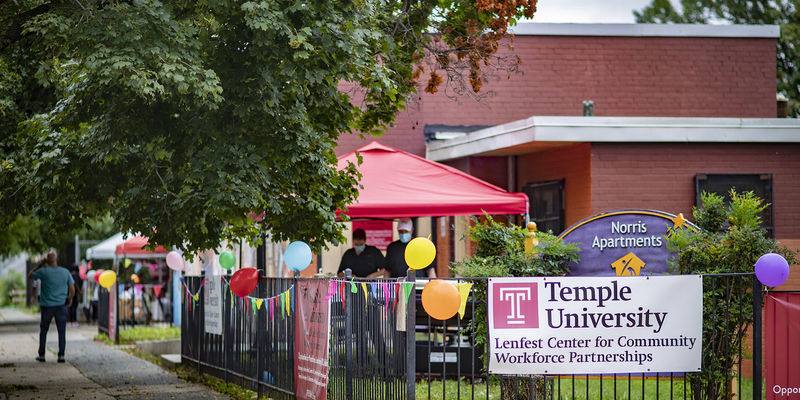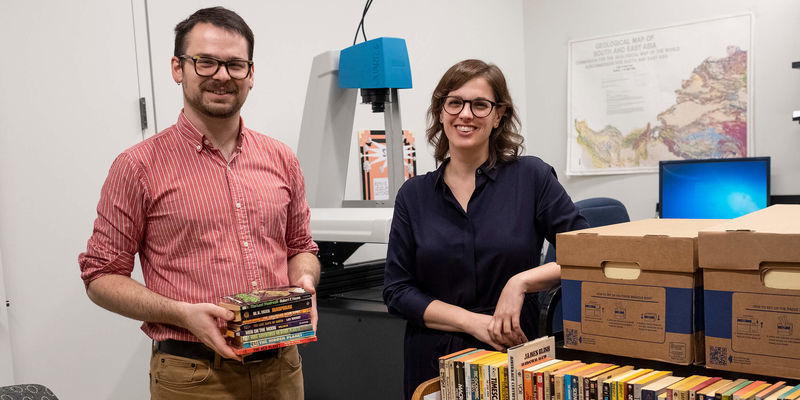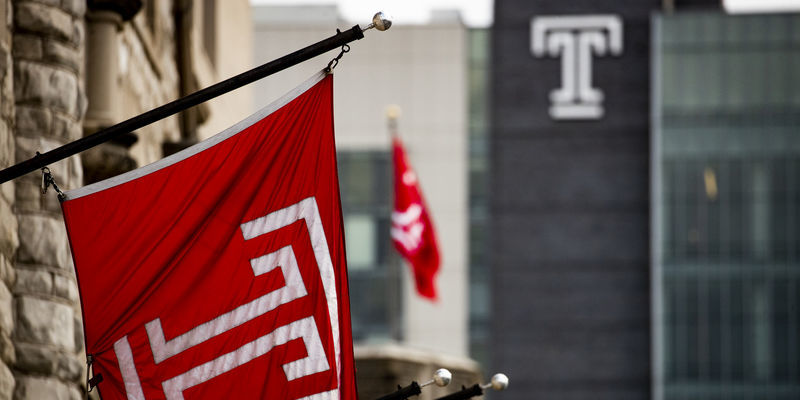Philly Community Wireless offers internet for the community, by the community
A group of community organizers, technologists and researchers—including Temple University staff—are working to build a free wireless broadband network in North Philadelphia.
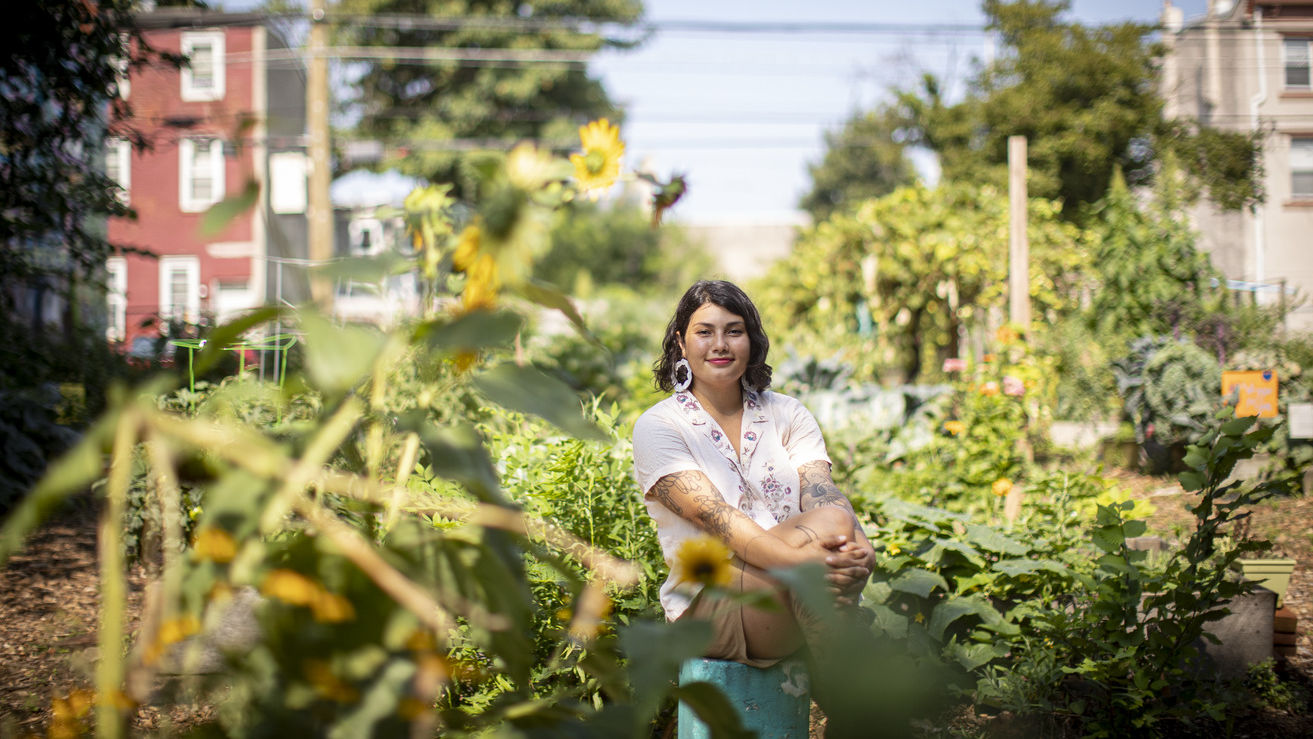
If there’s one thing the COVID-19 pandemic has shown many of us, it’s how much we rely on the internet. It’s crucial to how we work, learn and communicate, yet for some communities in North Philadelphia, it’s become harder to access just when they need it most.
Philly Community Wireless (PCW)—a group of community organizers, technologists and researchers who are all volunteers—has stepped up to help, building community-owned infrastructure and working to provide free, net-neutral Wi-Fi to residents in North Philadelphia. It’s internet access for the community, by the community.
The project began during lockdown last year, when a group of people from around the city, including Temple staff at Charles Library, the Health Sciences Library, Information Technology Services and the College of Liberal Arts, began to discuss what they could do to address inequalities in internet access.
“This was a project that made sense in the time of the pandemic, when suddenly the internet mattered in a totally different way for people’s basic business, education and healthcare [needs],” said Alex Wermer-Colan, digital scholarship coordinator at the Loretta C. Duckworth Scholars Studio and PCW’s admin lead.
The city of Philadelphia had been providing stipends to help people in underresourced neighborhoods access the internet, usually through major providers like Comcast or Verizon. But these were stopgap measures intended to last for limited periods. And once they expired, residents would have to find a way to pay for continued access.
“Our vision was an alternative model, so that there’s a sustainable internet [service] that’s locally controlled and allows the community to build it the way they want to,” Wermer-Colan said.
Constructing the mesh
Many in Philadelphia currently receive internet access through fiber-optic cables operated by providers like Verizon and Comcast. “Comcast and Verizon have spent years building out their network in Philadelphia and crisscrossing the city with wires,” said Jonathan Latko, executive director of information technology services and a member of PCW’s steering committee.
PCW’s approach is different. The group uses mesh networks: a collection of nodes or connection points that act as a single network, allowing providers to spread a Wi-Fi signal over a large area. Antennas pass signals across rooftops, then down to routers in users’ homes, enabling them to connect to the internet for free.
PCW is collaborating with PhillyWisper, an internet service provider that’s donating high-speed bandwidth to the community network. “We partnered with them [because] they’re independent, they’re small and they are very devoted to a net-neutral internet and respecting the privacy of their users,” Wermer-Colan said.
After considering several neighborhoods, PCW chose to launch its pilot project in Norris Square: an area, like many in North Philadelphia, that has struggled with internet access, but also has a rich network of community groups. “It was a community where we’d be able to find a lot of local organizations that could help, both in terms of outreach and, eventually, maintaining the network,” Wermer-Colan said.
The more nodes PCW can install in the community, the greater the area covered by the mesh network. Community members can contribute to the network by allowing PCW to install, for free, an antenna on their roof to help spread the signal. “We need to go block by block, and [see] how many of those antennas can we turn on,” Latko said. “Then we mesh those networks, so they sit on top of each other and we have complete coverage all around the square. This is just trying to do a little four-square-block area. But once we’ve figured that out, we can rebuild that model over and over again.”
The group’s Wi-Fi is currently available in and around Norris Square Park and the surrounding blocks, including at Las Parcelas—a community garden run by Norris Square Neighborhood Project. And PCW’s network is expanding, partly with the support of a grant from the Digital Literacy Alliance of the Mayor’s Fund for Philadelphia and the Independence Public Media Foundation.
Building a network
Alongside infrastructure, one of PCW’s major focuses is community outreach. “We’ve had a lot of conversations with potential partners, hearing more about the need in their community for the internet and how people have been blocked off from certain opportunities because of the lack of access, including things like telehealth,” said Heather Lewis-Weber, senior coordinator of community engagement at the College of Liberal Arts and PCW’s outreach team’s co-lead. “Having people be able to connect virtually to their providers is a huge, huge need.”
PCW’s commitment to outreach is also a major reason Amber Whetstone, Class of 2024, and Chris Mehretab, Class of 2022, both decided to intern with them over the summer. “The mission of Philly Community Wireless matches extremely perfectly with being a political science major,” Whetstone said. “It’s helping communities and bringing them together to empower them so they can reach their full potential. It’s exactly what I want to do.”
Mehretab agrees. “I really connected with the mission to actually go into neighborhoods and work with the community. I looked at a lot of internships to do this summer and I recognized that several community-related ones didn’t actually involve much work talking with residents and constituents in their areas. And I appreciated that Philly Community Wireless was an organization in which their main priority was going out into communities and having actual conversations with people.”
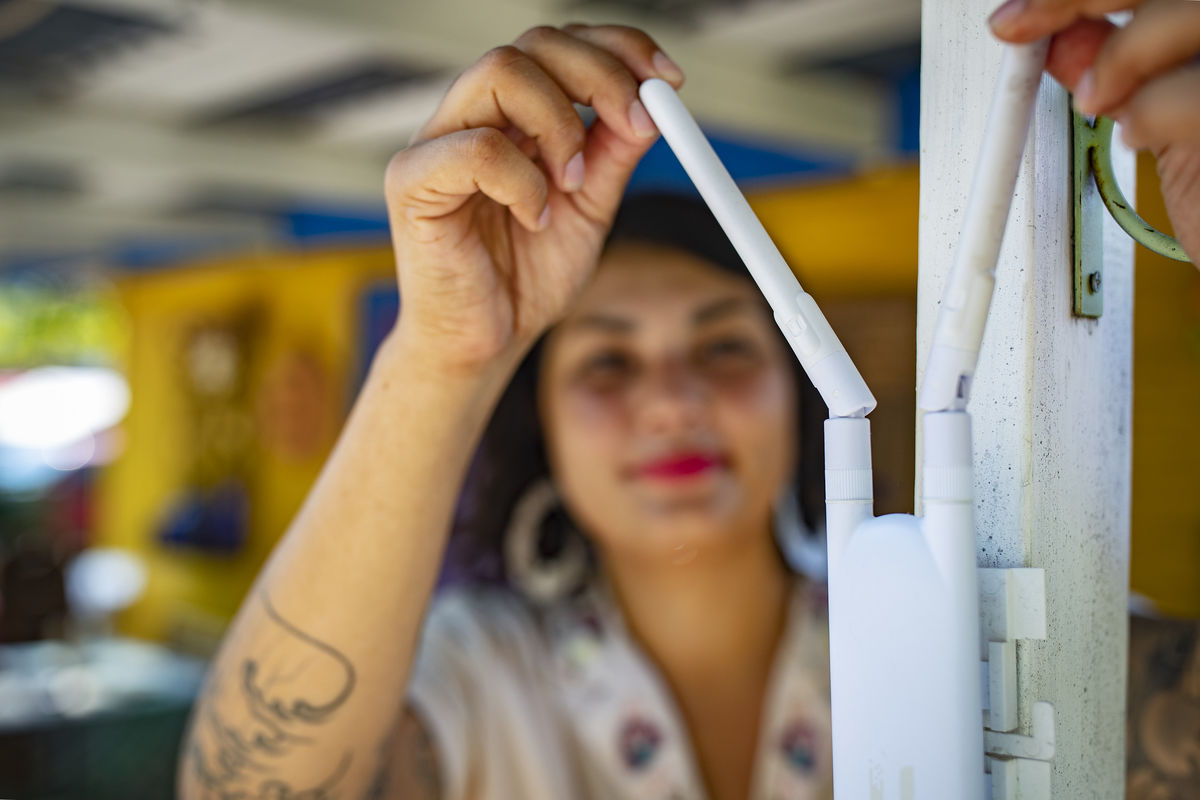
Philly Community Wireless uses mesh networks, in which a collection of nodes act as a single network and antennas pass signals across rooftops, then down to routers, enabling people to connect to the internet for free. (Photo by Ryan S. Brandenberg)
So far the community response has been positive. Cesali Morales, business manager at Norris Square Neighborhood Project, is delighted to have Wi-Fi at Las Parcelas. “Wi-Fi offers us the opportunity to be more mobile and connect in different ways,” she said. When she needed a break from working remotely during the pandemic, she would work in the gardens, occasionally chatting with neighbors and community members as they passed through.
Having Wi-Fi access has created even more possibilities for how the gardens are used. “We work with so many artists and community members and organizers. This is a critical component to being able to use the space effectively for all of their events,” Morales said.
PCW’s plan is ambitious and there have been challenges, from the pandemic disrupting supply chains and making it difficult to find equipment to the size of the project team. (PCW’s steering committee is made up of just over a dozen people; PhillyWisper is even smaller.) But the group is following the example of organizations across the country, including NYC Mesh in New York, and confident that PCW’s adapted model will work in Philadelphia as well.
Some residents’ technology needs go beyond internet access. PCW is also working with Temple Tech for Philly’s Digital Equity Center, which is offering (in conjunction with the Lenfest Center for Community Workforce Partnerships OWL Hub) a desktop computer, basic computer training and tech support for households that need a computer to use their new internet connection.
Serving the community
The knowledge that PCW’s work is needed keeps its members going. “I thought that this was a key mission for libraries. How do we claim to provide information to everyone if they can’t access the internet?” Wermer-Colan said. “Universities and libraries have been waiting for people to come to them: ‘We have this stuff so come and look.’ And suddenly your doors are closed.” The government paves the road for people to drive or walk to the library. “But no one paved the digital roads for them to get to the library. All these people can’t access our information because they don't have the internet or they don’t know how to use digital technology,” he said.
PCW helps ease their path and open new avenues. Many job applications, for example, are available exclusively online. ”It’s not like the old days, where you could walk around with your resume. If you don’t have access to the internet then you’re blocked off from some job opportunities,” Lewis-Weber said. “What I love about this project is being able to democratize access to the internet and enabling people to become upwardly mobile through that access.”
For Latko, the internet is as necessary as any utility. “I believe innately that we’ve come to a point [where it’s essential], just like everybody needs running water and electricity,” he said. “It’s going to become a basic human right to have access to the internet.”
When he came to work at Temple over two decades ago, one of the first things Latko read was “Acres of Diamonds”, Temple University founder Russell H. Conwell’s speech encouraging people to support the communities around them because that’s where the treasure lies. Latko has taken that principle to heart. “It’s why I exist and why I do the things I do in my life, polishing those diamonds that are close,” he said. “You don’t have to go around the world to find those diamonds; they're everywhere around us.”
Mehretab feels the same. As an Owl, he’s part of the North Philadelphia community; PCW is his way of giving back to it. “The main reason a lot of us choose our majors [and careers] is because, hopefully, most of us want to help people. So let’s start by helping the people right here,” he said.
PCW hopes the Norris Square pilot project will act as a proof of concept for the network, which will be developed, run and maintained by the community. The group is also negotiating with Temple to install antennas on university buildings, among the tallest in North Philadelphia.
It’s the next step in expanding an essential service. “For our neighbors to be able to access free Wi-Fi, especially during the pandemic, is vital. For our students, who need a place to do homework while also getting to enjoy the outdoor space, [Wi-Fi] is vital,” Morales said.
“I think public resources like this are essential for our community’s benefit. And the fact that this is free, I believe, is a really powerful step towards a more equitable future.”
—Edirin Oputu
